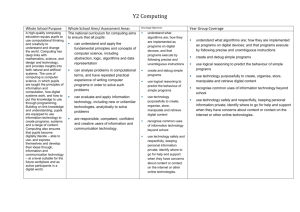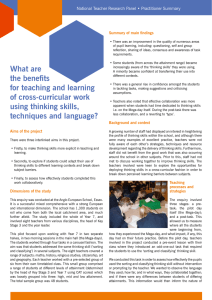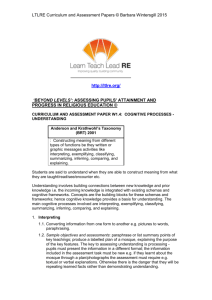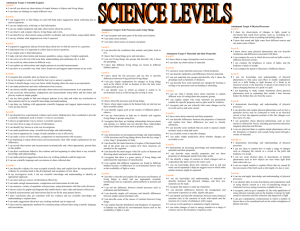Science Policy
advertisement
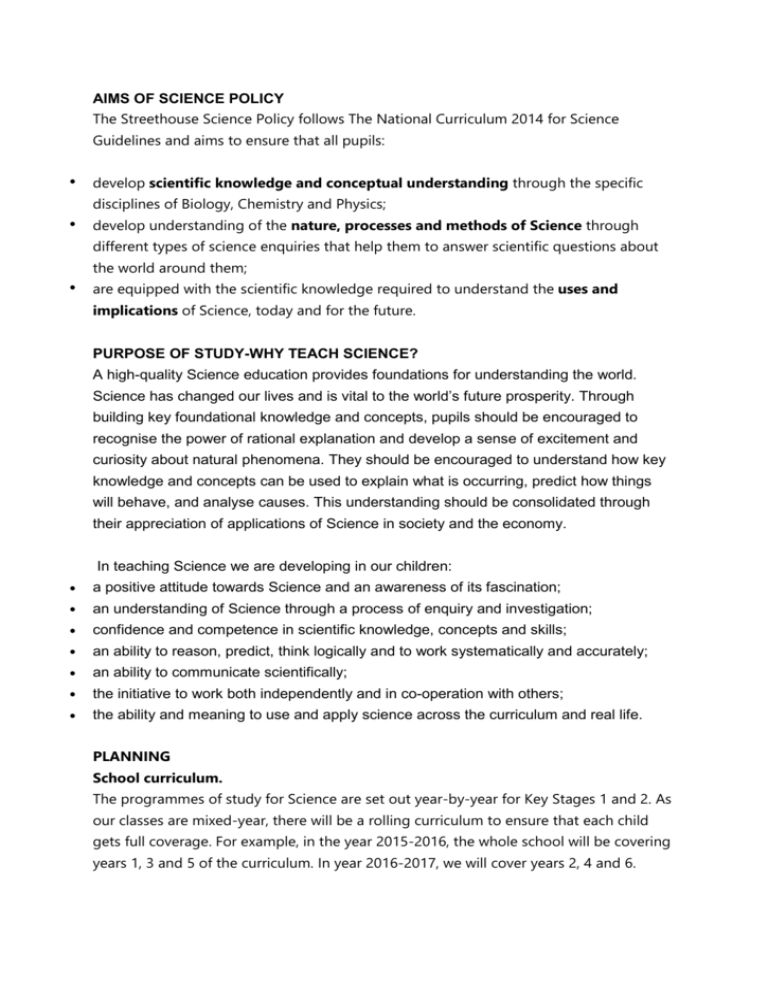
AIMS OF SCIENCE POLICY The Streethouse Science Policy follows The National Curriculum 2014 for Science Guidelines and aims to ensure that all pupils: develop scientific knowledge and conceptual understanding through the specific disciplines of Biology, Chemistry and Physics; develop understanding of the nature, processes and methods of Science through different types of science enquiries that help them to answer scientific questions about the world around them; are equipped with the scientific knowledge required to understand the uses and implications of Science, today and for the future. PURPOSE OF STUDY-WHY TEACH SCIENCE? A high-quality Science education provides foundations for understanding the world. Science has changed our lives and is vital to the world’s future prosperity. Through building key foundational knowledge and concepts, pupils should be encouraged to recognise the power of rational explanation and develop a sense of excitement and curiosity about natural phenomena. They should be encouraged to understand how key knowledge and concepts can be used to explain what is occurring, predict how things will behave, and analyse causes. This understanding should be consolidated through their appreciation of applications of Science in society and the economy. In teaching Science we are developing in our children: a positive attitude towards Science and an awareness of its fascination; an understanding of Science through a process of enquiry and investigation; confidence and competence in scientific knowledge, concepts and skills; an ability to reason, predict, think logically and to work systematically and accurately; an ability to communicate scientifically; the initiative to work both independently and in co-operation with others; the ability and meaning to use and apply science across the curriculum and real life. PLANNING School curriculum. The programmes of study for Science are set out year-by-year for Key Stages 1 and 2. As our classes are mixed-year, there will be a rolling curriculum to ensure that each child gets full coverage. For example, in the year 2015-2016, the whole school will be covering years 1, 3 and 5 of the curriculum. In year 2016-2017, we will cover years 2, 4 and 6. Medium term planning. We will ensure that in each unit of planning, we have in mind the five types of enquiries in the curriculum. These are: Observing change over time. Keeping records and finding patterns. Identifying and classifying. Researching. Fair test. Attainment targets By the end of each key stage, pupils are expected to know, apply and understand the matters, skills and processes specified in the relevant programme of study. Key Stage 1 The main focus of science teaching in Key Stage 1 is to enable pupils to experience and observe phenomena, looking more closely at the natural and humanly-constructed world around them. They should be encouraged to be curious and ask questions about what they notice. They should be helped to develop their understanding of scientific ideas by using different types of scientific enquiry to answer their own questions, including observing changes over a period of time, noticing patterns, grouping and classifying things, carrying out simple comparative tests and finding things out using secondary sources of information. They should begin to use simple scientific language to talk about what they have found out and communicate their ideas to a range of audiences in a variety of ways. Most of the learning about Science should be done through the use of first-hand practical experiences, but there should also be some use of appropriate secondary sources, such as books, photographs and videos. Pupils should read and spell scientific vocabulary at a level consistent with their reading and spelling knowledge at Key Stage 1. Lower Key Stage 2 – Years 3 and 4 The main focus of Science teaching in Lower Key Stage 2 is to enable pupils to broaden their scientific view of the world around them. They should do this through exploring, talking about, testing and developing ideas about everyday phenomena and the relationships between living things and familiar environments, and by beginning to develop their ideas about functions, relationships and interactions. They should ask their own questions about what they observe and make some decisions about which types of scientific enquiry are likely to be the best ways of answering them, including observing changes over time, noticing patterns, grouping and classifying things, carrying out simple fair tests and finding things out using secondary sources of information. They should draw simple conclusions and use some scientific language, first, to talk about and, later, to write about what they have found out. Upper Key Stage 2 – Years 5-6 The main focus of Science teaching in Upper Key Stage 2 is to enable pupils to develop a deeper understanding of a wide range of scientific ideas. They should do this through exploring and talking about their ideas; asking their own questions about scientific phenomena; and analysing functions, relationships and interactions more systematically. At Upper Key Stage 2, they should encounter more abstract ideas and begin to recognise how these ideas help them to understand and predict how the world operates. They should also begin to recognise that scientific ideas change and develop over time. They should select the most appropriate ways to answer Science questions using different types of scientific enquiry, including observing changes over different periods of time, noticing patterns, grouping and classifying things, carrying out fair tests and finding things out using a wide range of secondary sources of information. Pupils should draw conclusions based on their data and observations, use evidence to justify their ideas, and use their scientific knowledge and understanding to explain their findings. Pupils should read, spell and pronounce scientific vocabulary correctly.


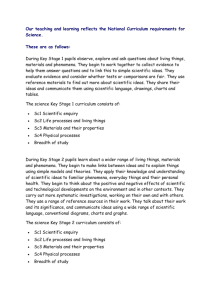
![afl_mat[1]](http://s2.studylib.net/store/data/005387843_1-8371eaaba182de7da429cb4369cd28fc-300x300.png)




